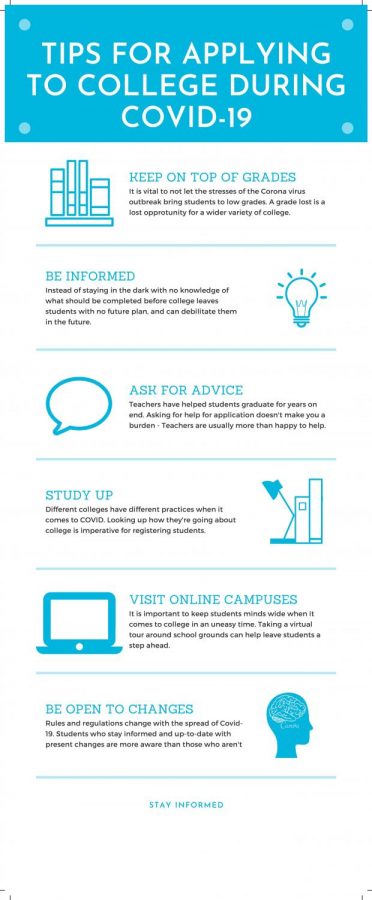Registering for College in an Uncertain Time
December 8, 2020
With a new class of seniors, in an already elaborate process that is researching and applying for college, the process of applying to college has been altered due to Covid-19.
With the shutting down of schools and the uncertainty of the future, the senior class of 2020 looks for guidance on how they should get to college and meet the graduation requirements. School counselor Cheryl Gray expresses her biggest concerns for the senior kids going to college next fall.
“[The biggest worry is] when is college going to look normal again? A lot of schools have gone to online learning only, so they’re trying to contemplate the cost of college, do they live in a dorm, how much would that cost. They’re dealing with quite a bit of decision making, financially speaking, there are a lot of decisions that normal senior classes don’t have to make. There’s been a lot of learning that can’t take place – a lot of normal preparation that doesn’t happen. They aren’t getting the test taking skills or the study skills that a normal senior class would get. Are they going to be mentally prepared?” said Gray.
With these worries, Gray tries to help her seniors with graduation, trying to keep the stress and worry to a minimum. The process to apply and register for college has made its tweaks in years prior, but it is nothing compared to changes with Covid-19.
“We always start our year with senior interviews, where we like to meet with every single senior. We sit down, and we make a plan and help them with the college application process. The follow-up process is even harder, because they’re only here every other day, so our time with them is much more limited,” said Gray.
Associate principal’s secretary, Christa Fish, specializes in primary assistance for seniors going into college. Fish weighs in on the similarities and differences between her assistance to graduation in this uncertain year compared to years prior.
“In reality, I’m really not engaging [with students] at all at this point. When we dealt with graduation this last spring, things were a lot more hands-off than with the planning than I normally would. With the upcoming graduation in May, there’s a lot of waiting and seeing, and I know that this time around, we have something to work with like we did last year,” said Fish.
Fish offers help with the entirety of the registration process, assisting anyone who asks for it or is recognized to need it. She notices a pattern in the difference of the amount of students she sees during the beginning of the school year versus the end of the year.
“Each school year, with a new senior class, I always begin the year with not very many people; [either] they don’t know where the office is or who I am. When seniors start to feel a little more comfortable or their parents start to push them [to talk to us], I start seeing more students. For now, there are more emails, for obvious reasons. When they get more comfortable, or they start to tell their friends, I start seeing more,” said Fish.
As the registration method continues to change and develop, it is usual to see changes in the method each and every year. Fish would not be surprised if some of the more accessible practices seen this year would drain over to the next.
“Our college representatives usually come on campus, this year and throughout the school year- we can’t have visitors- so they usually set up Zoom meetings. As a whole, I think we will continue our digital communications, I don’t think that’s going to leave. We’ll keep what works well when our society becomes healthier,” said Fish.
Seeing kids come for help is a good way for Fish to know that they are in good hands when it comes to reaching graduation milestones. Fish tells what is her favorite part about being in the center of the process.
“Obviously, it’s a lot healthier for relationships and connections to do things face-to-face, so when students are able to come in person, it’s an opportunity to connect with them. On the other side of that, we don’t want to pull them away from class time. Being able to see kids face to face, it helps me to see and to hear better what they’re looking for and what they’re meeting,” said Fish.
After so many changes, people rely on Fish and her associates to give them the final say in the plan for graduation. With new plans come more changes. Fish is sure to be quick on delivering the final plan to all seniors, teachers and parents.
“There’s a lot of adjustments and a lot of changes that have been put into place by having to go virtual and so many different things. Last spring, juniors were not being able to do the ACT – a lot of ACT tests were cancelled or postponed. And the recruitment or the research that current seniors are doing, it’s not as easily accessible,” said Fish.
Senior Kiersten Grant has been applying to college since the start of the school year. With the difficulties of the changing schedules, Grant looks on the bright side of things.
“I am most looking forward to the advanced education in college. As a music student, there is only so much I can learn while in high school. I am excited for the opportunity to play with advanced ensembles, further my musical knowledge, and finally be in an immersive environment for my future. I won’t have to take any math or science like classes, like I am in high school. I will get to take all music and psychology classes, which I am excited for,” said Grant.
In years prior, the registration process was already a hassle in and of itself, but this year, things only seem to become more challenging. While applying has become harder for a lot of students, Grant believes that the waiting before acceptance is the hardest part.
“I think the most stressful part is not knowing if you’ll actually be admitted. Between transcripts, ACT scores, and admission requirements, it can be really stressful. I don’t want to make all my plans around one college, in case I don’t get accepted. But then maybe something goes wrong with my backup school, it’s all crazy. As a musician, schools don’t really look at my grades and high school transcript as much. They look at my experience, and mostly my admission audition. The virtual audition process has by far been the most stressful for me as an individual. I plan to pursue a Music Therapy BA so I not only have to audition on my selected orchestral instrument, but with voice, piano, strings, and music theory knowledge. I am just scared that I am going to go through all this preparation and grueling audition processes just to end up not being accepted,” said Grant.
Grant is sure not to let these challenges and obstacles overcome her and is even more aware to keep on top of her work. However, even then, she tries to get help from her teachers, who have experienced being asked about graduation years prior.
“I have gone to my counselor and Mrs. Fish in the senior office for help with signing up for college, as well as my advisor Mr. Beneke. They have all answered a lot of my questions, and helped me with application essays and those sorts of things,” said Grant.
The new school year does provide its challenges, with the graduation requirements, policies and changes. As the less experienced ask for assistance and advice with what they should have completed before such a big change in their lives, Fish and Gray hope they know the importance of not giving up.




